Two buddies survived fighting Islamic State, but for one civilian life was too much
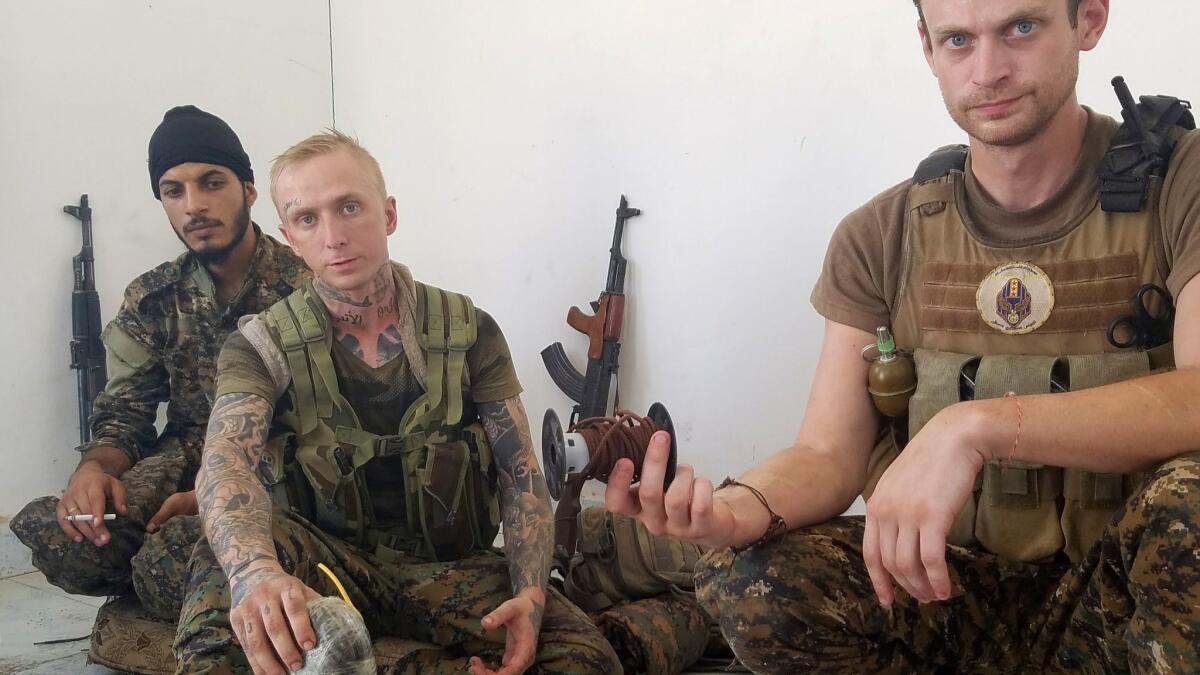
He was dashing up the mountain into darkness, chasing a friend armed with a shotgun.
Taylor Hudson yelled for his friend to wait, to stop.
They had rushed together toward danger so many times before on the battlefields of Syria. They had protected each other, made it home safe.
Cactus pierced Hudson’s sides as he scrambled up to save his buddy.
Then he heard the gunshots.
Hudson had met Kevin Howard three years earlier in eastern Syria, where they discovered they both had volunteered for the French Foreign Legion.
Hudson, 35, was an idealist raised in Pasadena, a lanky college dropout and ironworker kept out of the Marines because of a wrist tattoo he unsuccessfully tried to burn off with battery acid.
Howard, 27, was his opposite: short, with a blond crew cut and tattoos up to his eyebrows. Adopted at birth, he’d been rejected by his new parents at 12, then raised in a San Francisco orphanage. He left at 17 to join the Marines, trained at Camp Pendleton and served from 2006 to 2010, deploying twice to Iraq as an anti-tank missileman.
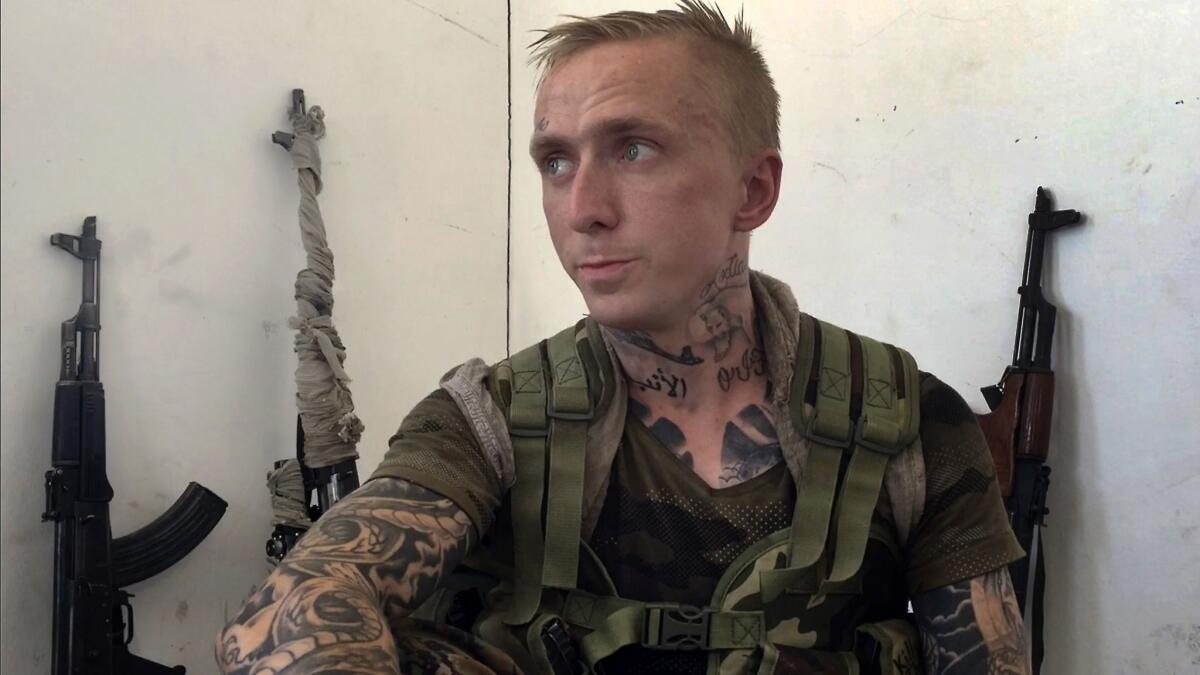
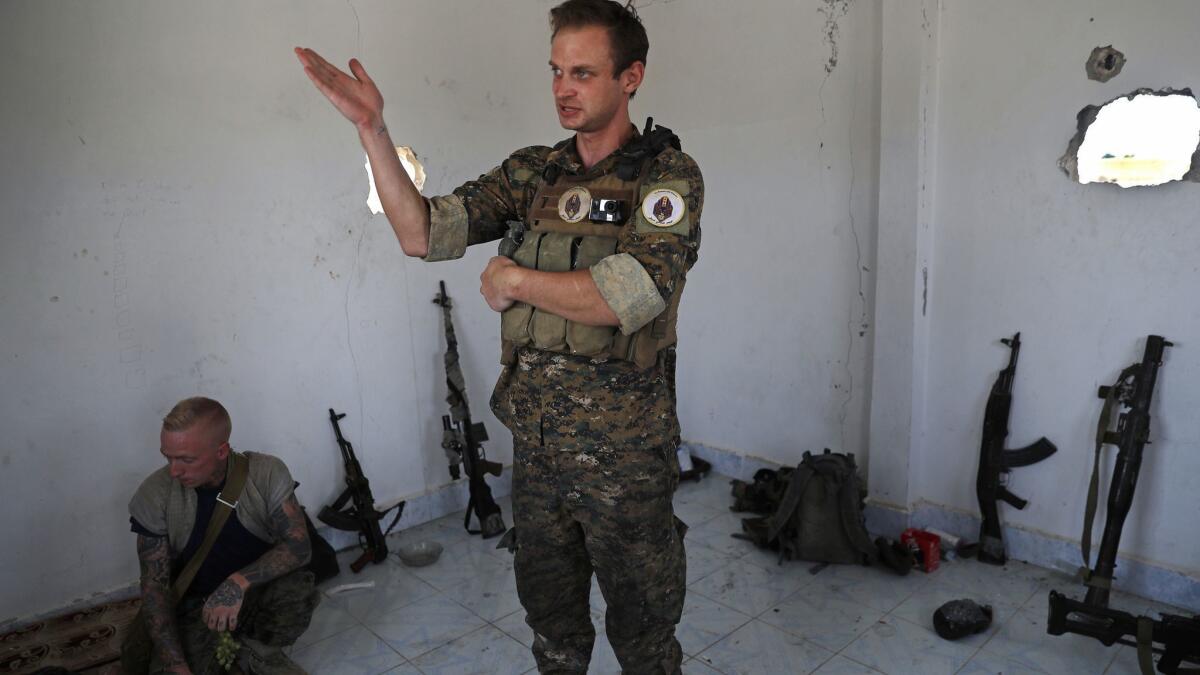
The men had both joined the French Foreign Legion for adventure, Howard training as a sniper, Hudson as a medic. They adopted noms de guerre: Howard chose Kane Harlly; Hudson became Paul “Doc” Hetfield. Howard had the title of the legion’s anthem tattooed above his right eyebrow: “Rien n’empeche.” Unstoppable.
But they became disillusioned as superiors confined them to southeastern France and enviously followed news of the war raging in Syria. In 2016, each joined U.S.-allied militias to fight Islamic State.
“The war was like a sanctuary, as crazy as that sounds,” Hudson said as he sat in his spare Tucson ranch house. “It was black and white, good and evil, the most pure fight in modern times. That feels so good to be with people in a righteous cause. When that’s over, what has meaning in civilian life?”
A month after Hudson arrived in eastern Syria, he met Howard. Howard served with a poorly outfitted group of Kurdish fighters, who had stopped to visit Hudson’s unit bivouacked in the cow shed of an abandoned cheese factory. Hudson noticed Howard’s camouflage legionnaire pants and struck up a conversation.
The pair soon began working as a team: Howard as a sniper; Hudson, his lookout.
“I knew we were always going to stick together,” Hudson said.
They shifted to an allied Christian militia, the Syriac Military Council. Before an important battle, their commander left and the unit voted unanimously for Howard to replace him. Hudson became chief medical officer. They were reluctant leaders, Hudson said, but “sometimes you find yourself in situations where you know you have a responsibility.”
In summer 2017, the unit moved to the outskirts of Raqqah, capital of Islamic State’s caliphate, for the start of a siege. They remained holed up in abandoned, bombed-out buildings for months.
That July, during an interview in a crumbling house they had converted into a sniper’s roost, Howard and Hudson appeared weary but committed. They pointed out Islamic State strongholds a few yards away and warned that drones sometimes buzzed nearby, dropping bombs.
They never felt safe. Their fellow fighters had scant training and could be careless with guns. The pair looked out for each other, sleeping in shifts.
Howard recalled his time as a Marine, battling Muslim extremists in Kurdish northern Iraq. He had tried returning to civilian life, but “it just didn’t work out.” Staying home as a war raged felt wrong, he said.
He divided western volunteers in Syria into four groups: politically motivated anarchists and socialists; “starry-eyed” dreamers; those fleeing their past; and the “legitimately crazy.”
Hudson noted that his friend hadn't classified himself, and Howard laughed.
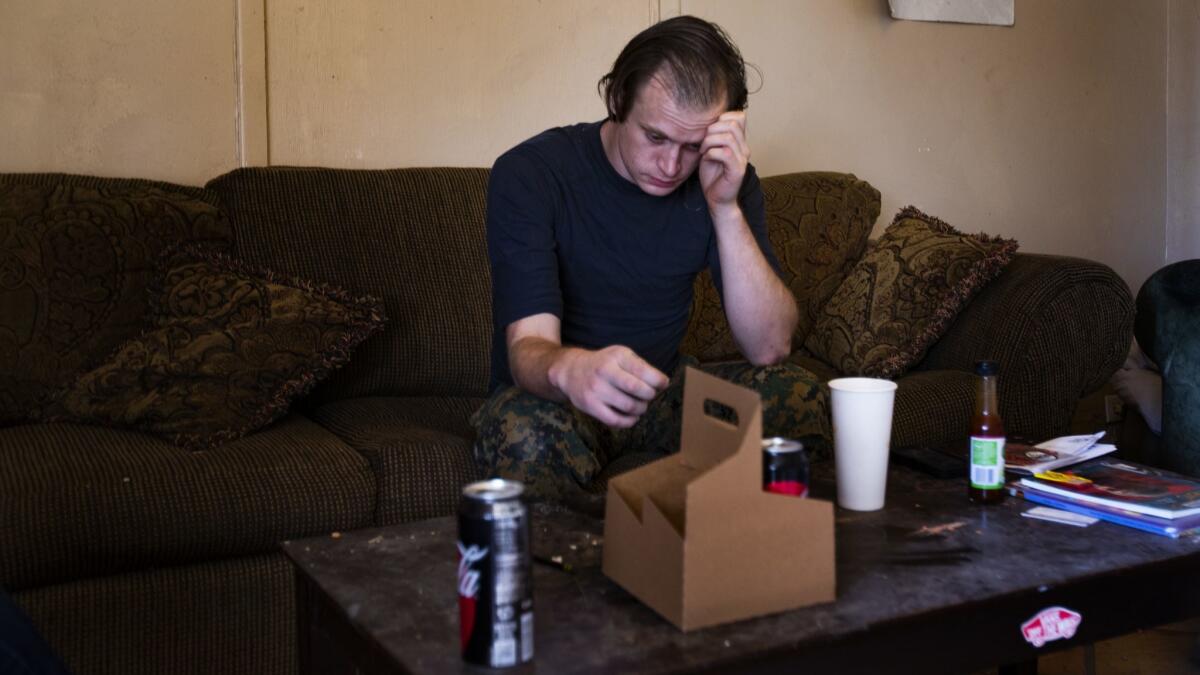
Hudson took breaks from the front lines, staying with a Christian Syrian couple. He fell in love with their daughter, got engaged and started planning a future.
Howard had two words tattooed on his knuckles: “love” and “lost.” He stayed in Raqqah and embraced the Assyrian Christian cause, including a new nom de guerre: Hawro, or “Brother,” Christian.
“They are arguably the most oppressed people in the world right now,” Howard said. “I believe in staying and helping them fight because it’s what I’m good at.”
In time, both men soured on the militia.
Hudson, wounded by shrapnel and a drone bombing, left the front line to get treatment. His fiancee broke off their engagement. Commanders refused to allow him to return to battle, he said, even as they pushed Howard south toward the worsening battle in Dair Alzour.
Each of the men heard the other had been killed. When they were reunited weeks later, they decided it was time to leave the militia — and Syria.
Eventually, Howard and Hudson returned home after harrowing months detained by their own militia. Howard was also held by authorities after crossing the border into Iraq, released only after U.S. officials intervened.
Years would pass before they reunited.
Howard floundered in the U.S., stripped of his gun, his unit and his cause.
He visited friends in California and Idaho; reconnected with his birth mother in Grants Pass, Ore.; worked oilfield jobs in North Dakota and west Texas. For a time, he ran with the Hells Angels in Oakland.
Last year, he became homeless in the Dakotas, unable to claim veteran’s disability benefits because he couldn’t find the necessary paperwork until he asked friends to help.
Hudson had built an extra room in his house for Howard, and urged him to visit. Howard initially demurred. Then one day he texted Hudson a photo of pill bottles, threatening suicide. Hudson wired him plane fare. Howard flew to Arizona the next day.
There Hudson helped him rent a nearby house, a life goal Howard had written on a list he carried in his pocket.
Howard went to doctor’s appointments at the Department of Veterans Affairs for post-traumatic stress disorder and got a caseworker. He adopted a cat. He met a woman. Three months ago, at an iconic mountain west of downtown known as Sentinel Peak, he proposed. She said yes.
Hudson thought his friend was healing.
But after Howard’s girlfriend moved in, the couple fought. He suspected her of cheating. His caseworker knew he had been drinking too much and tried to get him into rehab.
Howard told friends he missed Syria.
Hudson understood how Howard felt: “That was where we belonged. That was our place and our time in history. We were motivated and focused and knew what we had to do. That’s what’s missing when you get home, that mission-oriented way of thinking.”
Half of their former unit was fighting alongside rebels in Ukraine. But Howard didn’t want to join them.
“It wasn’t really his fight,” Hudson said. “He did love the lifestyle — the camaraderie, the guys. But he wasn’t willing to join a cause he didn’t believe in.”
Howard considered going back to Syria, or joining rebels in Myanmar. Hudson found that odd.
“He didn’t even know what side he was going to fight on,” Hudson said. “It made him seem suicidal, like, ‘I’m just going to roll the dice.’”
Howard admitted he still contemplated suicide. So the two friends made a pact: If one decided to kill himself, he would call the other first.
This spring Howard stopped returning phone calls and blocked close friends on social media, including Hudson. Friends urged Hudson to stop by Howard’s house. But he thought his friend needed space.
Howard got another tattoo on the left side of his head, next to Rien n’empeche. Unstoppable. It was the name of a fellow rebel fighter who’d just been killed in Syria. He added a message, a catchphrase often posted by Syrian militias after they lose fighters: “Martyrs never die.”
About a week later, on April 30, Howard climbed Sentinel Peak at sunset with his 12-gauge shotgun.
He did not honor the pact he’d made with Hudson. Instead at 7:29 p.m. he texted another friend. “Yo, I’ve committed suicide. Take care of the cat. Sorry for the inconvenience.”
Then Howard started posting on Facebook under his Syrian nom de guerre, Hawro Christian. He shared photographs: himself in Syria, hoisting his assault rifle; his military duffel bag, stuffed with snapshots of his ex-fiancee; a photo of Marine and French Foreign Legion flags tacked to a wall where he had scrawled “I was a rebel commander in Syria” and a quote from a volunteer killed in Syria last year: “I don’t know how to get back on this road.”
At the top of the post, he added, “Goodbye everyone.”
Fellow volunteer fighters alerted authorities and tuned in to the online Tucson police scanner for updates. Marines who had served with Howard sent a veteran to the park, who arrived just before Hudson.
By then, SWAT officers in riot gear had cordoned off the area. A police helicopter hovered overhead. Hudson persuaded an officer to allow him up the hill, climbing as fast as he could past cactus in the dark. His impulse was to protect Howard, to talk him down, to have his back.
That’s when he heard three gunshots echo in the darkness. Hudson returned to the police officer.
“You didn’t shoot him, did you?” he asked.
Police had not fired, records show. Listening to the online police scanner, Howard’s friends as far away as Syria soon learned the truth: Howard had shot himself in the head.
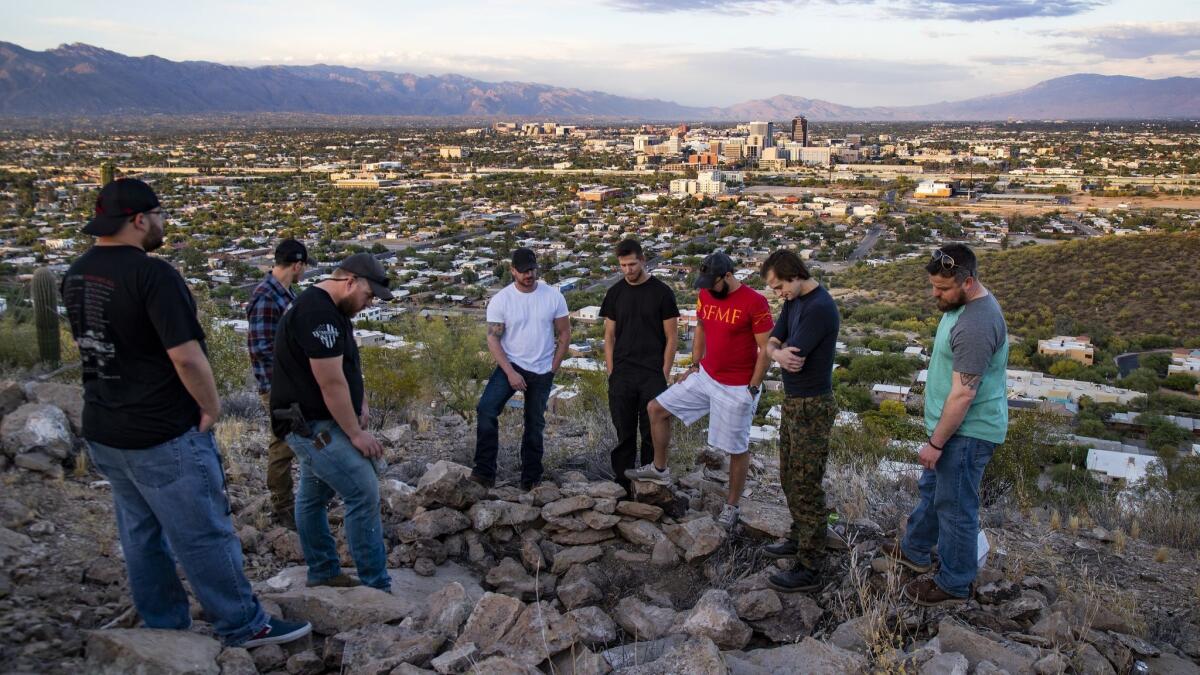
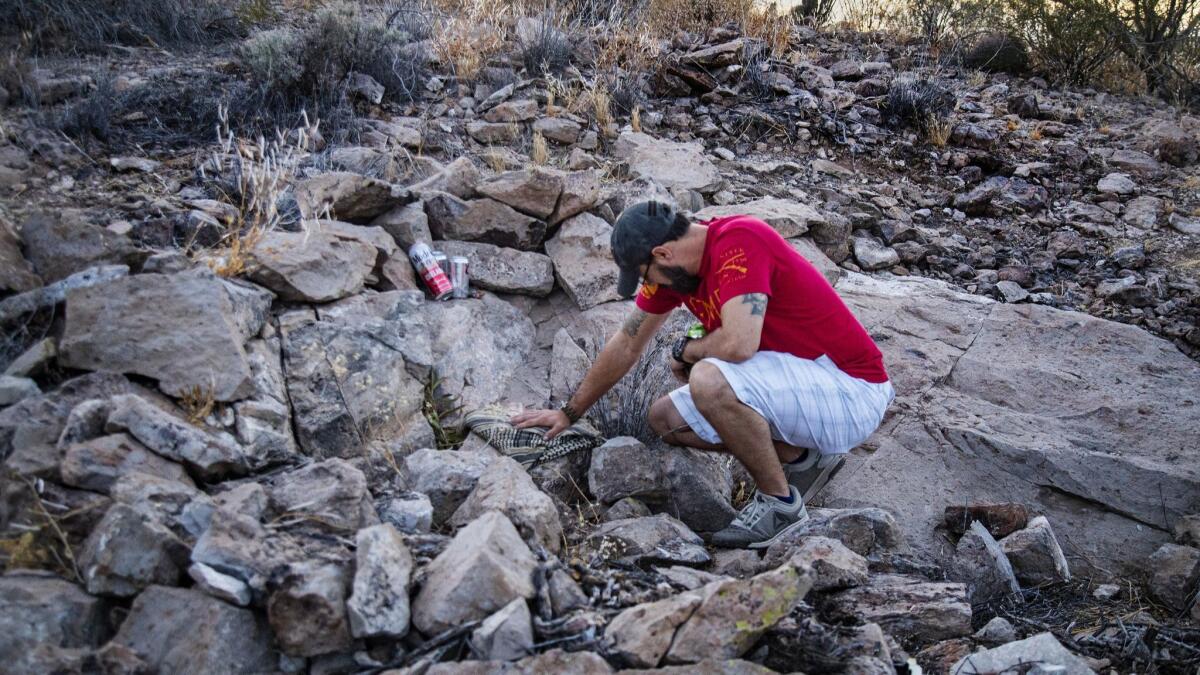
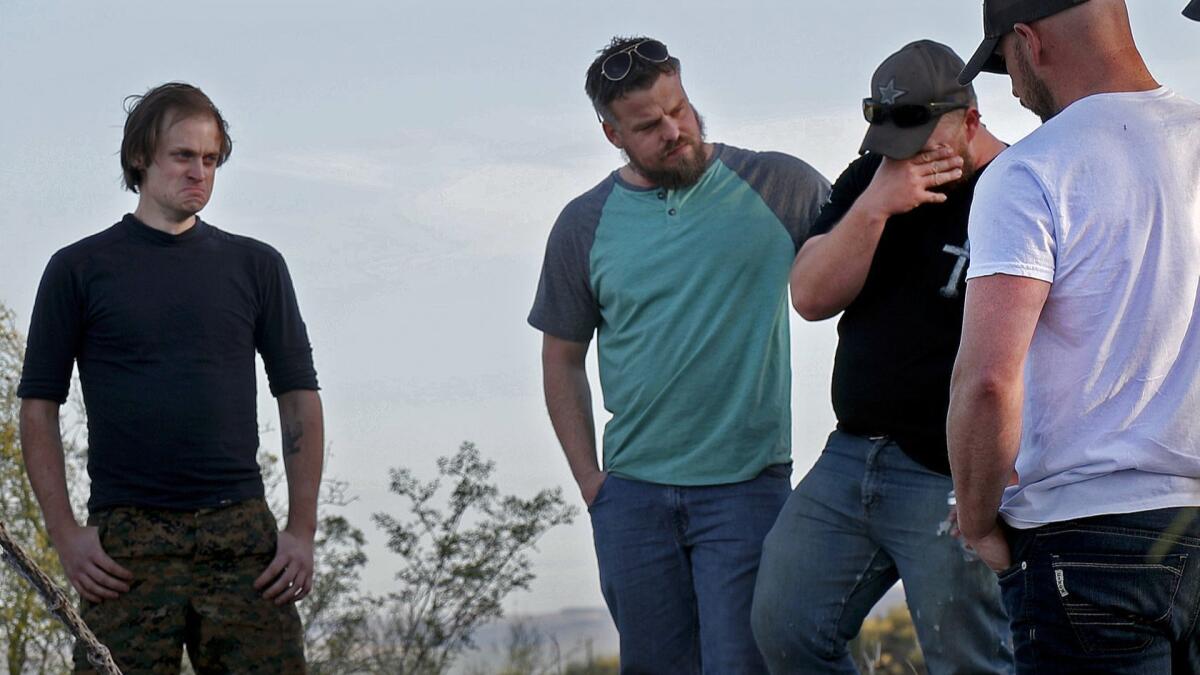
But officers at the mountain were busy investigating, and didn’t tell Hudson right away. His cellphone was dead. It would be hours before a SWAT van took him to a hospital where a police commander shook his hand, and he knew.
News of Howard’s death spread quickly on Facebook, where veterans said they regretted not contacting him in his final days. Hudson told them it might not have mattered.
"Sometimes you do everything you can for someone that you love but it's still not enough,” Hudson posted the next day. “If someone is determined to end their life, there is nothing you can do short of trying to physically restrain them, which I did try, he was just faster than me.”
Kurdish and Christian militia leaders mourned Howard online as a martyr. Acquaintances claimed he was their heval, Kurdish for brother. Hudson was disgusted.
“Ignored, used and mistreated by so many in life, in death he is suddenly everyone's best friend, everyone's hero,” he wrote on Facebook.
Hudson propped a front-line photo of his fallen friend against a votive candle next to a bullet in his living room. His mind and body reverted to Syria mode, hyper-vigilant. The nine medications he had been taking for anxiety, depression and seizures didn’t seem to work. He clenched his jaw, bit his nails and shuddered every time a military plane buzzed his house on its way to a nearby base.
He tried talking about his wartime trauma in therapy, “how killing puts a distance between you and other people.” The counselor couldn’t grasp that he had fought without being in the U.S. military. She seemed horrified. He stopped going.
He was in bad shape. But when half a dozen Marines who served with Howard came to Tucson to claim his remains, Hudson agreed to be their host. Maybe it would help.
On May 10, the Marines descended on Hudson’s house from Idaho, Michigan, Oregon and Texas. All had lost fellow veterans to suicide. Some had contemplated killing themselves.
Hudson greeted them wearing camouflage pants and combat boots. They shared Coors and Marlboros, scrolling through recent text exchanges with Howard, veering from silence to raucous laughter as they compared notes on Howard’s life. They shared war stories so outlandish that Howard had resisted telling them when he came home because he said nobody would believe him.
In their stories, the Marines called him Kevin. Syria fighters like Hudson called him Kane.
William Mostoller, who had driven down from Idaho, said he saw Howard save the life of a supervisor injured on an oil platform while they were working in North Dakota last year, carrying him to safety and performing CPR.
Donnie Farmer, who had also struggled with addiction and attempted suicide, said he hosted Howard on his farm in Oregon last summer and tried to get him sober, just as he had helped other veterans. Howard preferred to run from his problems, Farmer said. Now he was making funeral arrangements with Howard’s mother.
“These guys want to go and chase the dragon, but they don’t want to do the work to look inside themselves,” he said.
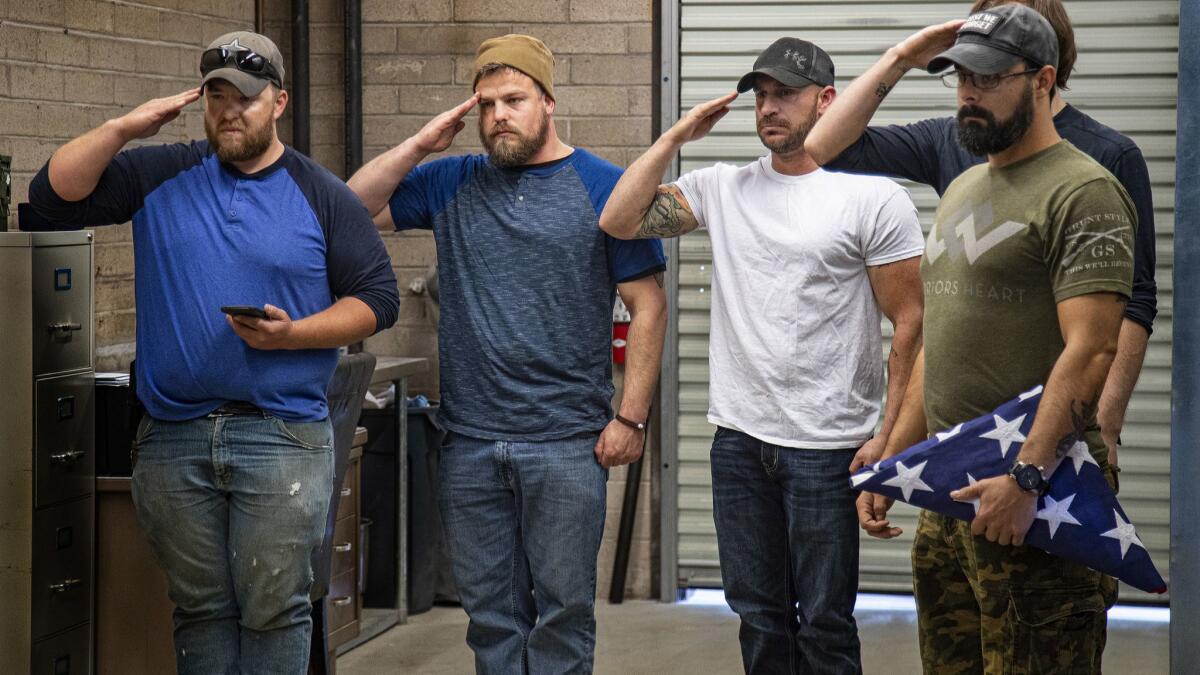
At sunset, Hudson led them up Sentinel Peak. They were joined by the Marine who chased Howard that night. They stopped at a circle of rocks where Howard spent his last moments. To them, it looked like a foxhole.
Earlier that day, Farmer had claimed Howard’s personal effects from police, sealed in clear plastic and smeared with his blood. Now he spread them on the ground for the other men to examine. There were vestiges of war — his checkered keffiyeh and trove of ChapSticks — but also snapshots and a photo album, all of his ex-fiancee.
The veterans draped the keffiyeh on the rocks, lighted a candle, poured out a beer and their grief:
“Let this be a reminder to everybody when your brother is hurting.”
“You told me you wanted everything I had: The wife, the kids, the house. I promised you I’d help you get it.”
“I’m tired of getting initials tattooed.”
It was Hudson’s turn.
“I hope wherever you are, you’re not hurting,” he said. “Because I knew you were, here, in a way I couldn’t understand.”
The next morning, they gathered around a pit at the foot of the mountain to burn Howard’s photos, unleashing a stench as acrid as his camp in Raqqah. Then they left to join Howard’s former Marine caseworker at a crematorium.
Howard’s body was waiting for them in a cardboard coffin under a white sheet. Farmer added Howard’s military pack. A worker asked if they wanted to see the body. No one did.
Instead, they unfurled a U.S. flag over the coffin, paid their respects and folded it into a neat triangle.
Hudson alone sobbed. The sound filled the concrete room. Farmer rubbed his shoulder. Justin Schnepp, who had fought in Syria, embraced him.
Hours later, the worker emerged with Howard’s ashes, poured at the veterans’ request into a green metal ammunition box.
“I give you Kevin in an ammo can,” Farmer said.
Farmer would take the ashes back to Howard’s mother in Grants Pass, where they held a memorial service Friday. Friends will gather again July 20 in San Francisco to strew Howard’s ashes from the Golden Gate Bridge, his final wish. They started an online fundraising campaign to cover the $10,000 funeral expense that has raised more than $14,575.
“We can’t let this happen again,” said Robert Van Horn, 26, who lives outside Phoenix and had been introduced to Howard by their Marine caseworker.
“We won’t,” Hudson said.
But even as they mourned, Schnepp mentioned that he may leave soon to join volunteers fighting in Ukraine.
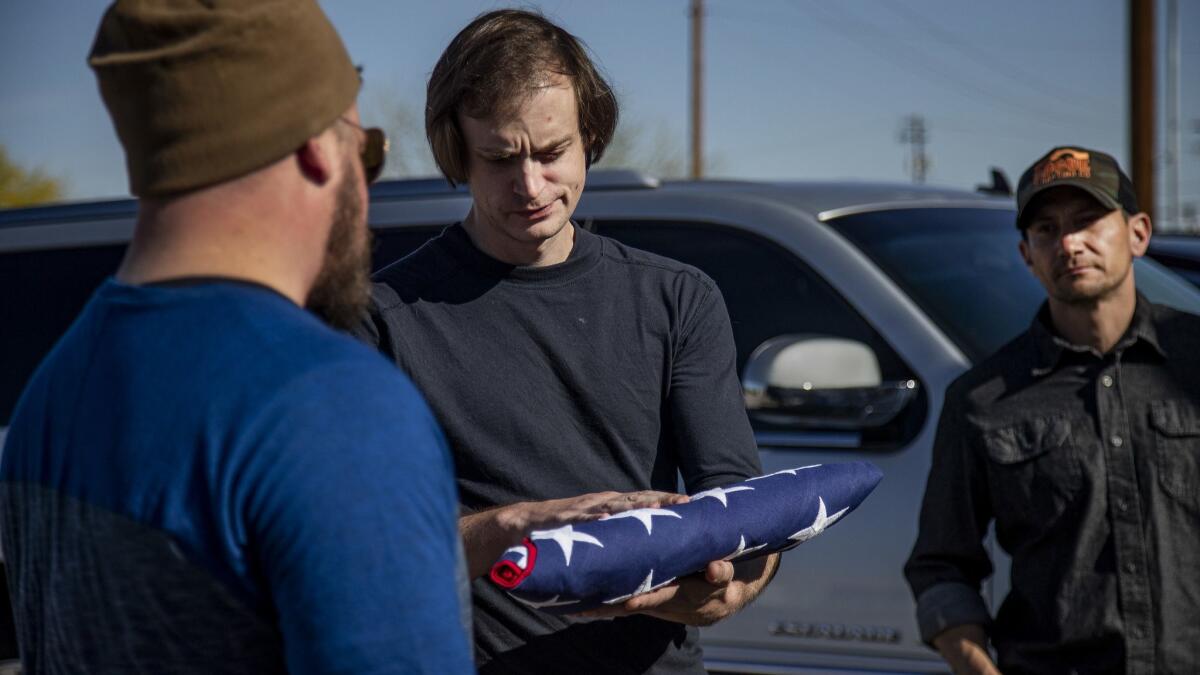
In the days after the veterans’ visit, Hudson said he still wanted to help others.
“You can’t blame yourself, but you also have to accept that you have a responsibility to your friends,” he said. “You do make a difference and can ultimately be that reason that they hold on just a little bit longer.”
But Hudson’s medications couldn’t lift his depression. He had trouble talking; went days without sleeping. When he did, he awoke lethargic. One of the Marines had offered to help him get a lucrative oilfield job, but Hudson didn’t have the strength to work for a week straight. He started dating a veteran friend long distance, then blew up at her over something minor.
The morning of May 22, Hudson took a friend’s gun and posted a suicide note on Facebook, just as Howard had:
“My head trauma is getting the better of me… I did this with the utmost clarity. Take care of each other. We had some times brothers. It was the greatest honor of my life to have served with you.”
He asked friends not to alert police. They did anyway. They called him too. Hudson didn’t answer.
Friends reached out to him, and each other, on Facebook. “Who is in Tucson right now that can get to his house?” Farmer wrote.
The widow of a Syria volunteer said she was driving there with her kids.
“I’ve talked to your mom,” she wrote to Hudson on Facebook. “Stay with me.”
By the time she and other friends arrived at his ranch house, it was surrounded by police, just as Howard’s had been.
This time, there would be no gunshots.
Hudson surrendered. Mainly, he said later, he decided to live because of others: He worried about traumatizing the neighbors and children he could hear outside.
Behind the story: A Marine suicide, and then a reckoning »
He was placed on a two-day psychiatric hold. The doctor was skeptical of his war record, until he showed her news stories about him posted online.
On May 24, he was released to his roommate, who drove him home. When he returned to Facebook, it was to thank those who saved him, who had his back.
“There’s so many people falling through the cracks,” Hudson said a few days later. “I feel fortunate.”
Hudson plans to attend Howard’s memorial in San Francisco next month. Until then, friends are still calling daily to check on him.
Here is a list of organizations that provide suicide prevention resources »
Start your day right
Sign up for Essential California for news, features and recommendations from the L.A. Times and beyond in your inbox six days a week.
You may occasionally receive promotional content from the Los Angeles Times.




